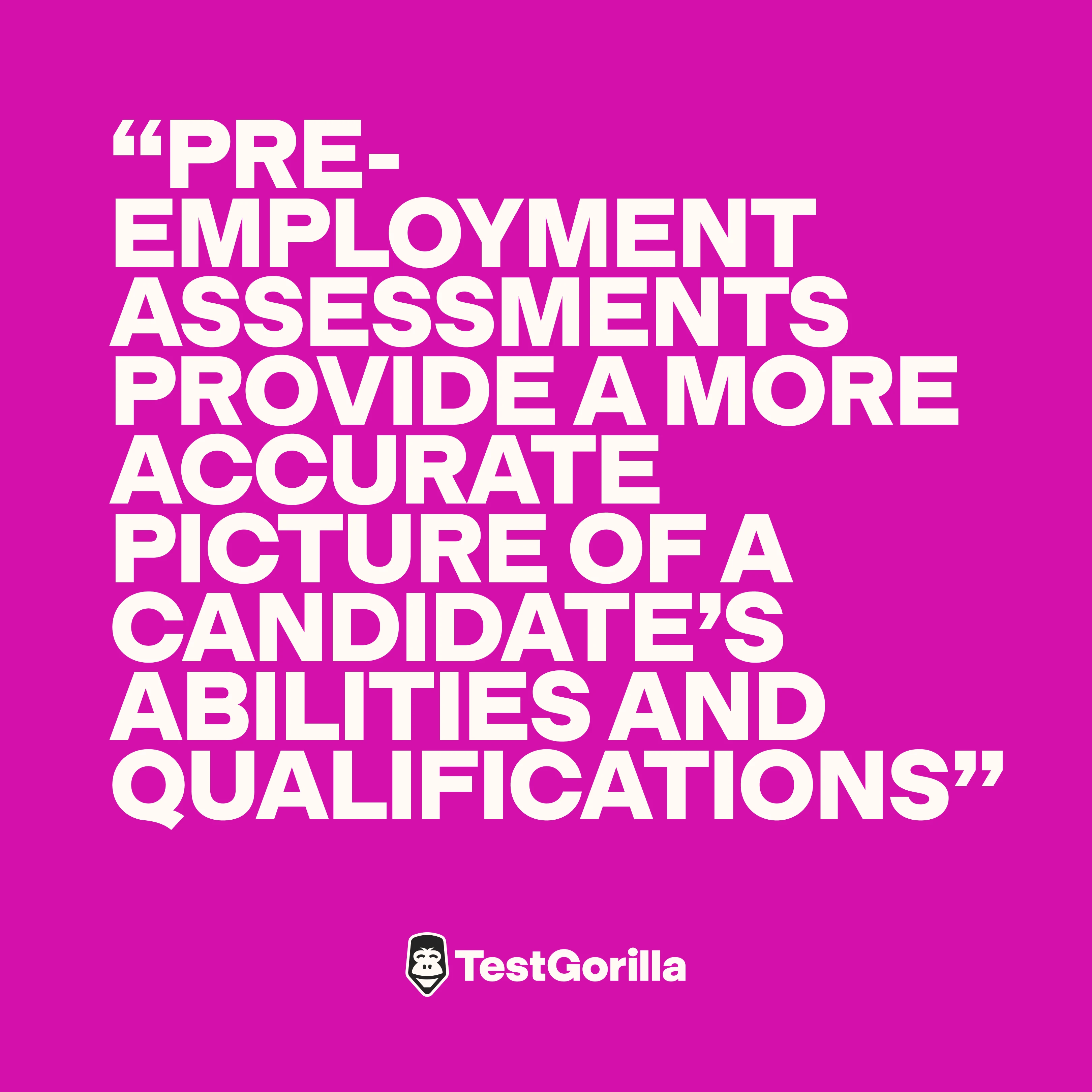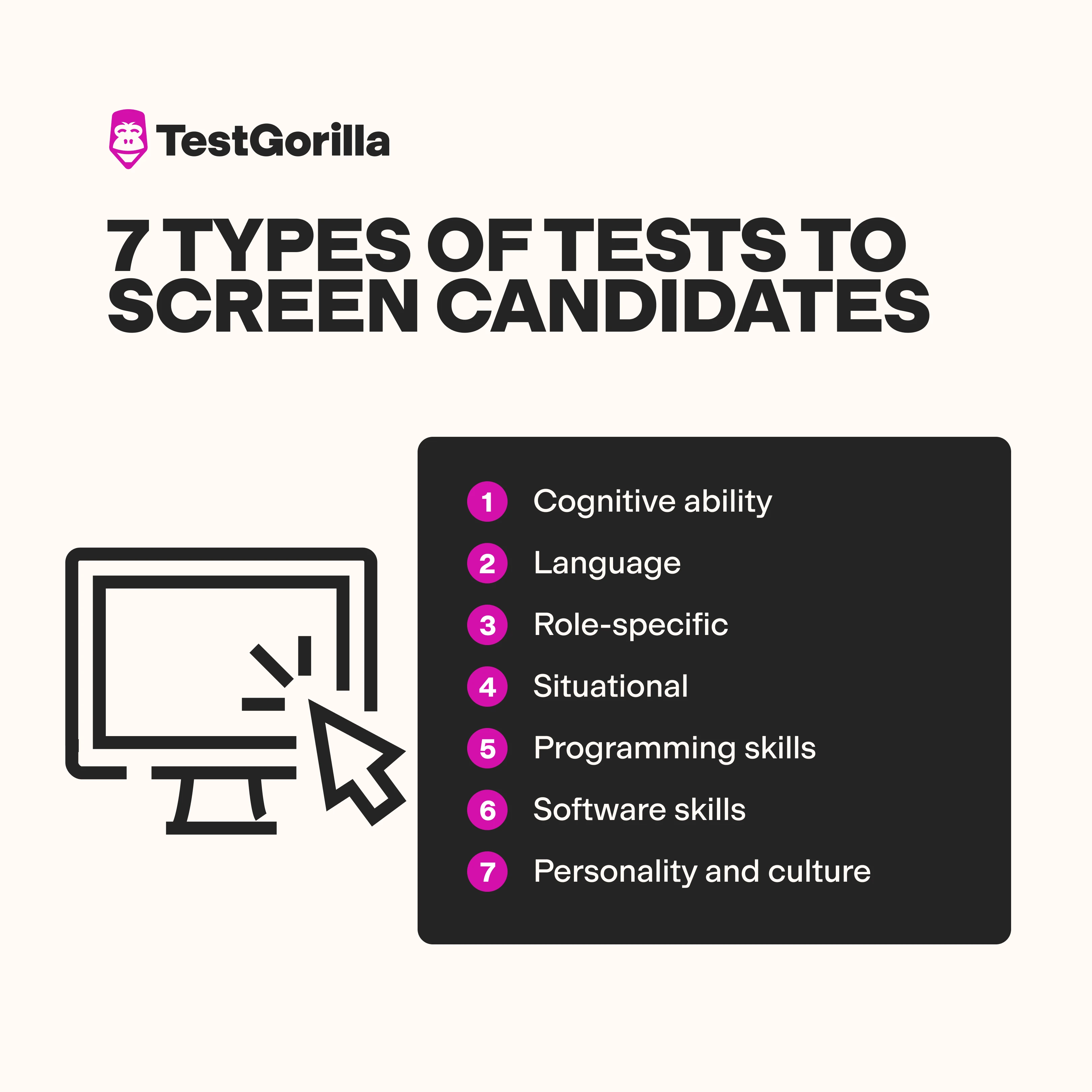Is it taking you longer than usual to fill open positions in your organization?
Perhaps it’s time for you to rethink your recruiting and hiring methods. For example, resume screening is one recruiting process that tends to slow down the entire recruiting cycle.
Enter pre-employment screening.
With pre-employment tests, hiring managers and HR departments can solve the issue of unfilled positions and reduce the time to hire.
Want to know more about how pre-employment screening can help you with your recruitment goals? Here’s a quick guide to pre-employment screening tests to get you started.
Table of contents
- What is pre-employment screening?
- What are the stages of the pre-employment screening process?
- What are pre-employment screening tests?
- How to use pre-employment screening tests
- 7 types of tests to screen candidates
- How to use the results of pre-employment assessment tests
- Use pre-employment screening tests for faster and bias-free hiring
- Frequently asked questions
What is pre-employment screening?
Pre-employment screening is the process of evaluating job candidates before hiring them. The process can include skills testing, reference checks, background checks, drug testing, and more,
Pre-employment screening aims to ensure that an organization is hiring trustworthy, qualified candidates. It can also help identify potential risks or red flags that may impact the candidate’s ability to perform the job or fit into the company culture.
What are the stages of the pre-employment screening process?
The pre-employment screening process is designed to help employers make informed decisions about which candidates to hire. It typically involves resume screening, pre-employment assessments, and background and reference checks.
Resume screening
During resume screening, the recruiting team reviews the resumes of candidates to determine if they have the qualifications and experience required for the job. This step is typically done by HR professionals or hiring managers, which helps narrow down the pool of candidates.
Pre-employment assessments
Pre-employment assessments often follow the resume screening process. These assessments measure a candidate’s skills, knowledge, and qualifications. A pre-employment assessment may include aptitude tests, personality tests, and skills tests.
Online skills assessments like TestGorilla can help employers rank candidates by skill level and focus on evaluating the resumes of the most qualified candidates. Aside from saving time for recruiters, everyone with the necessary skills gets a fair shot at the job. As a result, employers can make more informed decisions and find the best candidates for the job.
Background and reference checks
The final stage of the pre-employment screening process is the background and reference check.
This step involves contacting the candidate’s previous employers, educational institutions, and professional references to verify their qualifications and work history. Organizations do background and reference checks to ensure that the candidate is honest and has a good work history. It also provides an opportunity to identify any red flags that may have been missed during the earlier stages of the screening process.
It’s worth noting that some companies may not perform background checks because they do not have the resources or because they do not see it as necessary for the position they are hiring for. For example, a startup may not have a large budget to conduct background checks.
Meanwhile, finance, healthcare, and education companies are more likely to perform background checks to ensure their customers’ and employees’ safety and security. Some companies may also be required by law to conduct background checks. Transportation and childcare industries are great examples.
What are pre-employment screening tests?
Pre-employment screening tests are an objective, standardized method of determining a candidate’s skills, cognitive abilities, knowledge, personality, and emotional intelligence, all of which are relevant to determining candidates’ suitability for the role.
Pre-employment assessments automatically rank each applicant according to the results of the tests, helping decision-makers make more informed, data-driven judgments on each applicant’s suitability for the role.
Pre-employment screening tests versus resume screening
Just one job opening can attract hundreds of applicants, which requires recruiters to screen each one to make sure they filter out unsuitable applicants and place the most promising applicants at the top of the pile. Although Applicant Tracking Systems reduce resume screening time, they can also be clunky and unintuitive to use.
With the job applicant pool at an all-time high, pre-employment screening tests and assessments represent an easier, faster, and fairer way of narrowing down the list of potential candidates. As well as reducing resume screening time, they can also, when relevant, replace phone interviews.
Create a strong pre-employment assessment.
Looking for the perfect candidate? Check out our guide to the tests that you need to identify the strongest hire. Learn more.
How to use pre-employment screening tests
Pre-employment screening tests can be used at any point before hiring a candidate. However, when applicants are asked to complete pre-employment screening tests at the top of the hiring funnel, this also helps sort the serious applicants from the “resume spammers”. It’s fair to assume that applicants who take the time to complete the tests are truly interested in the position.
You may also discover that while a candidate has a strong resume, they don’t actually have the critical skills required for the position.
7 types of tests to screen candidates
Not every open position nor company will require the same range of pre-employment screening testing. Here are seven types of pre-employment tests that can help you make more informed hiring decisions.
Cognitive ability tests
Cognitive ability tests assess a candidate’s capacity for verbal and mathematical reasoning, perception skills, critical thinking abilities, level of attention to detail, and problem-solving skills.
For example, for senior roles, these tests evaluate a candidate’s ability to make sound decisions in a fast-paced environment, accounting for multiple moving parts.
Cognitive ability tests typically consist of short, multiple-choice tests in the form of logic puzzles, reading comprehension tests, or mathematical problems.
Language tests
Language tests evaluate a candidate’s proficiency with a specific language (Spanish, French, German, etc). They are typically divided into the desired proficiency level, whether that be A1 (beginner), B1 (intermediate), or native to bilingual (C2).
Assessing language skills helps you check whether a candidate truly has the language skills written on their CVs. TestGorilla’s language tests have rigorous anti-cheating features built in to make sure test results are as accurate as possible.
Role-specific tests
Role-specific tests do just what they say on the tin. They test for skills and abilities that are directly relevant to the role they’re applying for.
From Technical SEO roles to Warehouse Supervisors, these tests evaluate specific skills and knowledge to help whittle down candidate pools. Since each role is so different, these tests can consist of multiple-choice questions, essays, video responses, file uploads, or custom coding questions.
Situational judgment tests
Situational judgment tests consist of descriptions of a specific situation — usually around risk, ethics, or stress — and ask the candidate to answer how they would best handle the situation.
These tests are aimed at testing a candidate’s theoretical knowledge against theoretical contexts, and help evaluate individuals for managerial and leadership roles.
Programming skills tests
Programming skills tests assess a candidate’s skill level across specific programming languages and frameworks, such as Python, Ruby on Rails, and TypeScript.
These tests help evaluate whether a candidate has the required skill level for the open role, and usually last longer than other types of pre-screening employment tests, and will consist of specific programming questions as well as other problem-solving questions.
Software skills tests
Software skills tests assess your candidates’ knowledge of the software they will need to use in the role. Almost every role in the modern world requires some kind of software use, from Hubspot to Gmail, Microsoft Word to Shopify.
Knowing how well your candidates can use the software they will come across in the role is crucial to understanding how well they will perform. Of course, not every role requires expert knowledge of certain software and the candidate could learn on the job.
Personality and culture tests
Personality and culture tests offer insights into a candidate’s character and whether their personality fits with that of the wider team and company. These tests are often assigned before the first interview to help hiring teams gain a broader view of the candidate. The results help decision-makers get a better understanding of the candidate’s character, motivations, identity, and more.
How to use the results of pre-employment assessment tests
We answer this question in great detail in our guide to pre-employment testing, but there are two main things you should do once the results are in:
Validate test results first
To check the validity and accuracy of test results, you can have your existing employees with a similar role or skillset take the test. If your top performers don’t fare so well, then the test is unlikely to help you identify good candidates.
Decide how much weight the test results carry
No hiring team makes hiring decisions on one factor alone. Test results help you identify suitable candidates, but interviews, trial projects, and other assessments will also form the basis of any hiring decision.
Use pre-employment screening tests for faster and bias-free hiring
Relying on traditional resume screening takes far too long and presents too many opportunities to make hiring mistakes.
It’s time to shake up recruiting and hiring processes. TestGorilla enables you to create highly customized assessments for candidates, that consist of different skills tests and custom questions to help you evaluate candidates and make data-driven hiring decisions.
Find the best candidate assessment tool for your business.
Make pre-employment screening easy with top candidate assessment software. Check out our guide to the best tools out there. Find out more.
Frequently asked questions
What is pre-employment screening?
Pre-employment screening is the process of evaluating job candidates before hiring them. The process can include skills testing, reference checks, background checks, drug testing, and more,
What are the stages of pre-employment screening?
The stages of pre-employment screening are resume screening, pre-employment assessments, and background and reference checks.
What are pre-employment screening tests?
Pre-employment screening tests are an objective, standardized method of determining a candidate’s skills, cognitive abilities, knowledge, personality, and emotional intelligence, all of which are relevant to determining candidates’ suitability for the role.
Related posts
Hire the best candidates with TestGorilla
Create pre-employment assessments in minutes to screen candidates, save time, and hire the best talent.
Latest posts
The best advice in pre-employment testing, in your inbox.
No spam. Unsubscribe at any time.

Hire the best. No bias. No stress.
Our screening tests identify the best candidates and make your hiring decisions faster, easier, and bias-free.
Free resources
This checklist covers key features you should look for when choosing a skills testing platform
This resource will help you develop an onboarding checklist for new hires.
How to assess your candidates' attention to detail.
Learn how to get human resources certified through HRCI or SHRM.
Learn how you can improve the level of talent at your company.
Learn how CapitalT reduced hiring bias with online skills assessments.
Learn how to make the resume process more efficient and more effective.
Improve your hiring strategy with these 7 critical recruitment metrics.
Learn how Sukhi decreased time spent reviewing resumes by 83%!
Hire more efficiently with these hacks that 99% of recruiters aren't using.
Make a business case for diversity and inclusion initiatives with this data.





















